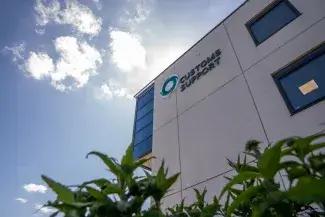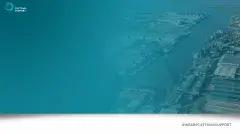I have been working at Customs Support for almost two years now. Last week I sat down with my colleagues Nathalie Roozen and Marc Verkaik to talk with them about how our company started. As they have been working at Customs Support even before we were called Customs Support they could tell me the following story:
Nathalie: “Customs Support started in 1999. We were actually a department of Slavenburgh & Huyser BV, an independent shipbroker that is still around. At the time Slavenburgh was an independent shipping agent representing shipping companies that called at the Port of Rotterdam but didn’t have their own agents. We were a mid-size company supporting these ships in other ways. We had water clerks, that cleared ships, we created shipping manifests, and we handled customs procedures.”
Marc: ”Actually, we were the back office for these ships. I remember that we had people that actually carried suitcases of dollars aboard, so the captain could pay his crew in cash. We arranged cash money, we arranged things like doctor’s and dentist’s visits, and any other appointments the crew on the ship might want or need. At first, we did that only for Slavenburgs’ own represented shipping lines, but we soon found that other shipping lines and/ or agents wanted to use our services as well.”
Nathalie: ”It was the reason we separated from Slavenburgh. There was an increasing number of shipping lines that wanted to use our services. Port Support, the first legal entity of Customs Support, was born. We became an independent company focused on back-office support for ships calling at the Port of Rotterdam, with an import focus on customs.”
The Start of a Growing Company
Marc: “There was clearly a need for an independent customs broker. We started growing right from the start. In 2000 we did our first acquisition, Mobiel Neutraal. Mobiel Neutraal was a customs broker that was also specialized in secondments, which is something we still do today via our consultancy department.”
Nathalie: “More and more we focused on being an independent customs broker. Our customs activities kept growing and in 2004 Port Support officially became Customs Support, to further emphasize our expertise in customs matters and our ambition to become the largest independent customs broker.”
Marc: “We were expanding into new regions in the Netherlands as well, like Vlissingen. The Port of Vlissingen handles a lot of bulk goods, like onions, bananas and wood. We had just opened our office there when a large container ship suffered so much damage that it had to be towed into the nearest port, which was Vlissingen. The containers needed to be loaded off the ship, which meant that all the paperwork needed to be changed. The containers were all destined to Rotterdam. The Dutch Customs Authority needed help with getting all the paperwork done. They were specialized in bulk goods and didn’t have the necessary knowledge to handle containers. Customs Support was asked to step in and help out. We were actually supporting customs! Being independent is important in cases like that and being independent has always been one of our most important traits.”
From Bulk Cargo to Containers to Live Animals
Nathalie: “By constantly expanding our company, acquiring other companies and hiring new talent we gained experience in many specializations. We enabled the import and export of a complete acrobatic circus. No tigers or elephants that time, this was a Cirque du Soleil type circus. I also remember a shipment of helicopters arriving. Mechanics from the factory flew in to manage the unloading and assembly on the ground. Very fascinating. We’ve also handled the export of many racehorses. We have a site at Schiphol Airport that specializes in all sorts of animals. Fish, birds, but also snakes and alligators!”
From Typing on a Machine to Machine Learning
Marc: “A lot has changed since that first year. When we started we had typewriters with those carbon sheets. Remember those? Everything needed to be on paper. Copies of everything, paper everywhere. Fast forward to today and we have digitized a lot of our processes. Carbon sheets have been replaced by XML files that are digitally transferred via interfaces. We try to eliminate as much manual data entry as possible, so our specialists can focus on adding value.”
Nathalie: “It is why digitalization is one of our key focus areas. It is a way for us to be of even more value to our customers. Smoother processes and happy customers that can trade globally without having to worry about unnecessary delays at borders.”















